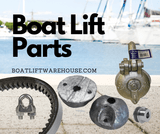
Maintaining a boat for the long-term can be challenging and yet is completely essential. Improper care can mean wasting large amounts of money on repairs or even a new boat altogether. Two of the big problems you may face are electrolysis and galvanic corrosion. While they may be tricky to tell apart, both can cause corrosion, especially if you don’t have your boat on a boat lift to keep it out of the water.
What is electrolysis?
Electrolysis is a process that involves electrical current and the metal areas of your boat. This means that metal hull boats are far more susceptible to corrosion at the hands of electrolysis. When an electrical current is running through the water, it will take away metal from one part of your boat and deposit it on another, dissimilar metal. For instance, a boat made of aluminum with a prop made of zinc results in corrosion. This occurs as the zinc is taken and deposited on the aluminum hull. As the metal being stripped away is what we see as corrosion on the boat. By keeping your boat on a boat lift, you can avoid any electrical currents in the water and keep your hull completely intact.
What is galvanic corrosion?
Galvanic corrosion is pure chemistry and does not require any electrical current to be present for it to occur. Galvanic corrosion takes place when two dissimilar metals are in contact and in the presence of an electrolyte salt water. Since the metals are different, one will be more reactive and will induce a reaction that leads to corrosion. This type of corrosion does not occur in fresh water, so if you keep your boat in a saltwater environment it may be best to get a boat lift to keep it out of a potentially harmful situation.
How do I protect against corrosion?
There are several ways you can limit corrosion, the best being to store your boat out of water. Whether you decide on a boat lift, elevator boat lift, or davit and a covering or you choose to pull your boat out completely after every outing, limiting the amount of time your boat sits unused in the water is key to longevity. If that isn’t something that you are able to do, covering the metal with paint or coating can help reduce the likelihood of a reaction. Additionally, changing the pH of the environment with chemicals can protect against unwanted damages.
Can it affect my Boat lift too?
The answer is yes, and the remedy is called sacrificial anodes. When you are in an environment that makes your boat or boat lift susceptible to electrolysis or galvanic corrosion, using zinc as a sacrificial anode is a wise precaution.
- A cathode is a negatively charged electrode. The more noble metal in the reaction will always be the cathode.
- The anode is a positively charged electrode. The less noble metal in a reaction will be the anode.
- Electrons travel more easily through salt water from the anode to the cathode. This is why having something like zinc anodes is important. It allows those electrons to leave the unimportant anode. That saves the important parts of your boat, and boatlift.
Note; You will need to monitor and replace the zinc as needed because it will likely be eaten away over time. If your anodes die quickly, you may want to check your dock for a faulty shore power ground lead.
Protect your Boat with a Boat Lift | Boat Lift Warehouse
Don’t wait until you see corrosion on your boat or boat lift, now is the time to act and start protecting your boat and boat lift. Boat Lift Warehouse has the highest quality boat lifts and boat lift accessories to ensure that your vessel stays in ship shape! Just visit our website today and learn more about how Boat Lift Warehouse helps you protect your boat!



